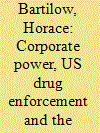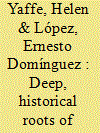|
|
|
Sort Order |
|
|
|
Items / Page
|
|
|
|
|
|
|
| Srl | Item |
| 1 |
ID:
165067


|
|
|
|
|
| Summary/Abstract |
The question that motivates this article is: what are the mechanisms through which the prosecution of the drug war in Latin America lead to human rights repression? In answering this question, I theorise that drug enforcement is a coalition of actors that facilitates domestic and international consensus around prohibition as a mechanism for corporate expansion. Drug war infrastructure financing is likely to facilitate the expansion of corporate investments by resource-seeking industries that require greater land use, which encroaches on the ancestral territories of indigenous peoples. And, in response to indigenous resistance to corporate appropriation of ancestral lands, resource-seeking transnational corporations will collude with private security firms and paramilitary organisations to repress and eliminate indigenous resistance. In the process of accumulating capital in Latin America, transnational corporations, domestic security, and paramilitary organizations are the drug enforcement coalition’s mediators of terror.
|
|
|
|
|
|
|
|
|
|
|
|
|
|
|
|
| 2 |
ID:
155141


|
|
|
|
|
| Summary/Abstract |
Colonialism, imperialism and anti-imperialism have been decisive in shaping Cuban political identity for 150 years. US determination to control Cuba, consistent with the Monroe Doctrine, had a strong economic rationale even before Spain was defeated in the War of Independence in 1898. Debate raged between Cubans who aspired to true independence and an annexationalist minority, who favoured union with the US. The Platt Amendment imposed on Cuba by the US in 1903 ‘reduced the independence and sovereignty of the Cuban republic to a myth’. Between then and the Revolution of 1959 Cuba was effectively first a protectorate and then neo-colony of the US, which dominated the Cuban economy, politics and foreign policy. Tackling the terrible socioeconomic and political effects of Cuba’s subjugation under the Spanish empire and then US imperialism necessitated a radical transformation of the Cuban economy, political institutions and power structures. The transition to socialism inevitably meant confronting US imperialism – and vice versa. Since 1959, US imperialism, with its powerful allies in the right-wing exile community based in Miami, have relentlessly tried to destroy the Revolution and Cuban socialism. The issue of imperialism remains key today, in the post-Fidel, President Trump era.
|
|
|
|
|
|
|
|
|
|
|
|
|
|
|
|
| 3 |
ID:
155133


|
|
|
|
|
| Summary/Abstract |
From the writings of Lenin, the guerrilla activity of Che Guevara, the anti-racism of the Black Panther Party and the Third World’s plan for a New International Economic Order, the idea of imperialism and the politics of anti-imperialism were a mainstay of political vernacular throughout most of the twentieth century. Yet, with the onset of neo-liberal globalisation in the Global North and, most importantly, in the Global South the idea of imperialism has seemingly disappeared or been deemed irrelevant. This special issue draws on a range of theoretical contributions that use the prism of imperialism to explore the strengths and limits of classical Marxist theories of imperialism; the relationship between Marxist, post-colonial and de-colonial approaches; imperialism and social movement theory; and the strengths of returning to ideas of Black Marxism and Pan-Africanism in the midst of contemporary neo-imperialism. These theoretical debates are in turn complemented by the collection exploring the idea of imperialism from different empirical vantage points in the Global North (Europe, US) and Global South (Africa, the Caribbean, Cuba and Kashmir). The issue thus provides both theoretically and empirically innovative interventions on how we should conceptualise and approach the idea of imperialism in the twenty-first century.
|
|
|
|
|
|
|
|
|
|
|
|
|
|
|
|
|
|
|
|
|